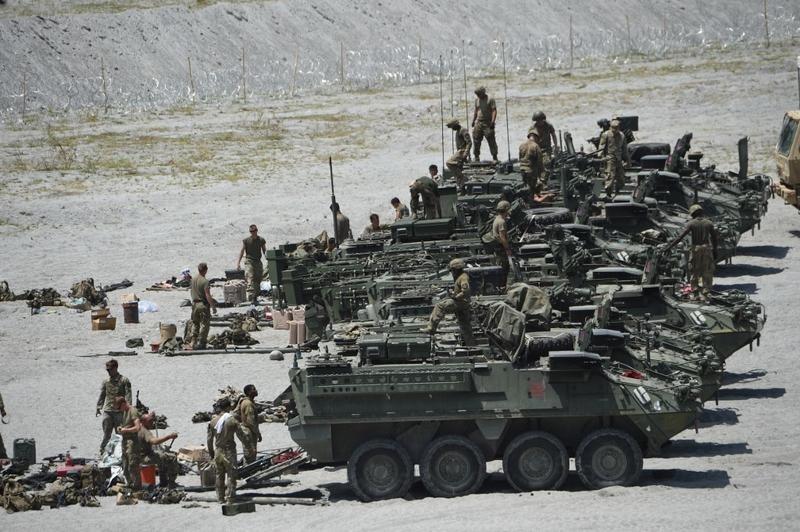 US army personnel stand on top of their Interim armored carrier strykers as they prepare to leave after participating in the live fire exercises, as part of the annual US-Philippines joint military exercise at Crow Valley, in Capas town, Tarlac province, north of Manila on April 10, 2019. (TED ALJIBE / AFP)
US army personnel stand on top of their Interim armored carrier strykers as they prepare to leave after participating in the live fire exercises, as part of the annual US-Philippines joint military exercise at Crow Valley, in Capas town, Tarlac province, north of Manila on April 10, 2019. (TED ALJIBE / AFP)
HONG KONG – The Philippines must pursue efforts to “disengage” from its long-time military alliance with the United States as it will help the Southeast Asian nation to craft a truly independent foreign policy, according to experts from a Manila-based think tank.
In an Aug 8 hybrid forum, representatives from the Asian Century Philippines Strategic Studies Institute, or ACPh, cited US House Speaker Nancy Pelosi’s visit to Taiwan of China, and criticized the US for stirring tension in the region and violating the one-China principle which is “one of the bedrocks of international law”.
They said the Philippines will have to review and reject the several treaties that it signed with the US, in order to avoid being dragged into a US-led proxy war.
“It is a positive note that as a country, we adhere to the one-China principle, which is one of the foundation of our bilateral relations with China,” Anna Malindog-Uy, ACPh’s vice president for external affairs, said at a weekly Pandesal forum. The forum is organized by Manila-based entrepreneur and columnist Wilson Lee-Flores.
Malindog-Uy said that Taiwan is just “a pawn of the US” and that the Philippine government “must not get involved and should not allow the country to be another pawn or proxy of the US”.
READ MORE: Philippines, US kick off large-scale joint military drills
She urged Philippines’ president, Ferdinand Marcos Jr., to abrogate military agreements with the US including the 1951 Mutual Defense Treaty, Enhanced Defense Cooperation Agreement and the Visiting Forces Agreement. She said the presence of these agreements is “an anti-thesis (to) the pursuit of a genuine independent foreign policy”.
Malindog-Uy was alluding to a statement made earlier by Marcos that his administration will pursue an independent foreign policy where the Philippines would be a friend to everyone and an enemy to no one.
It is a positive note that as a country, we adhere to the one-China principle, which is one of the foundation of our bilateral relations with China.
Anna Malindog-Uy, Asian Century Philippines Strategic Studies Institute
Herman Laurel, president of ACPh, cited Marcos’ earlier statement declaring China as the Philippines “strongest partner”, and said it is time for the Philippines to “choose a good friend”.
“To achieve this, the Philippines must begin the final disengagement from the warmongering and failing superpower,” he said, alluding to the US.
Adolfo Paglinawan, ACPh’s vice president for internal affairs, said that it is a “farce” to say that the Philippines has independent foreign policy, given the military agreements with the US.
He said these agreements were “loaded in favor of the United States and (against) our genuine national interest. They are swords hanging over our head and the head of our national security”.
The forum was held two days after US Secretary of State Antony Blinken met up with Marcos in Manila. Marcos said bilateral relations will “continue to evolve … in the face of all the changes that we have been seeing,” alluding to the rising tension between US and China over the Taiwan question.
“What is curious is that a few days after the Pelosi fiasco, Blinken (visited) Manila,” Paglinawan said, noting that this visit is “ominous” and indicates that the US is “(moving) forward for the next round of provocations”.
ALSO READ: Philippines' Duterte restores key military pact with US
He said it begs the question as to how Washington, “in spite of its withdrawal from Afghanistan, recession… and an impending defeat in its proxy war in Ukraine, is still insisting on pivoting to the Asia-Pacific”.
The Philippine Department of Foreign Affairs released a statement on Aug 4 stressing the nation’s adherence to the one-China policy and reiterating that it recognizes the People’s Republic of China as the sole Chinese government.
"The Philippines adheres to the one-China policy. The Philippines urges restraint by all parties concerned. Diplomacy and dialogue must prevail," it said.
Lucio Blanco Pitlo III, research fellow at the Manila-based policy think tank Asia Pacific Pathways to Progress, said in an interview with China Daily that Blinken’s visit to Manila occurred just days after Pelosi’s trip to Taiwan, so “it’s not unavoidable that people will suspect that there is some connection given the timing”.
Philippines, which borders China's Taiwan to the north, is "a longtime US treaty ally and Washington rotates troops in the islands and has access to several Philippine bases under bilateral military pacts. It is not unlikely for both sides to have consultations on how to respond to a possible Taiwan emergency. This may challenge Marcos’ attempt to sustain his predecessor’s (Rodrigo Duterte’s) independent foreign policy and keep relations with US and China, both important partners for the Southeast Asian country,” the analyst said.
READ MORE: Philippines extends termination proceedings of US troop deal
Austin Ong, a researcher at the Integrated Development Studies Institute, another think tank based in Manila, said that as “the world becomes more unstable and complex, the Philippines must evolve its relationships with all traditional and non-traditional partners. The challenge will be whether the superpowers will accept the changing multipolar arrangement”.
Contact the writer at prime@chinadailyapac.com


